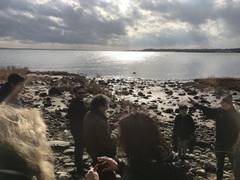Yitro 5779: The Ocean and the Cave
01/30/2019 09:33:05 PM
Jan30
| Author | |
| Date Added | |
| Automatically create summary | |
| Summary |
Two years ago, Daniel and I had the opportunity to visit Channel Islands National Park. The islands are about an hour's boat ride off the coast of Southern California. They draw in visitors with opportunities to be deep in relatively unspoiled wilderness in just a day trip from the concrete jungle of Los Angeles. Around the perimeter of the islands are many sea caves, rock formations carved out by the rhythms of the waves.
One popular activity in the park is sea cave kayaking, which we got to do. This involved a great deal of specialized equipment and assistance from an expert guide. But sure enough, there I was, kayaking in the open ocean, on a day when the waves were particularly rough, no less. Our group traveled up and back a section of the island's coast, in and out of beautiful sea caves.
What most sticks with me from this experience is just how difficult it was. It is easy to underestimate the power of the ocean, until you are actually in it, struggling against it just to move a short distance. Around you stands the evidence of the ocean's power: with its strength and unrelenting persistence, the ocean chips away rock.
As I sat in my kayak, rocking back and forth with the rhythm of the waves, I felt incredibly small. All around me was nothing more than water, the same water I drink and use all the time. I could easily reach to grab a handful of it, yet the water had a power and force much greater than mine.
Our parasha this week, Yitro, features the moment at Mt. Sinai when the people experienced God's revelation and received the 10 commandments. Having escaped Egypt, the people now stand to encounter God. It is a scene of tremendous power. The mountain is surrounded by flashes of lightening and claps of thunder and a dense cloud. The horns blow and the people, standing safely at a distance, tremble.
Then, somehow, God speaks, in such a way that the entire people can understand: “I am the Lord your God who brought you out of the land of Egypt, the house of bondage. You shall have no other gods besides me. Remember the Sabbath day. Honor your father and your mother. Do not murder. Do not steal. Do not covet your neighbor's house.”
Obviously, there is much to say about each of these commandments. But I want to draw our attention to the words that introduce them: “God spoke all of these words” (20:1). This phrase and others like it appear many times in the Torah, so many times that we scarcely notice them. We tend to accept the notion at face value that, in the world of the Torah, God speaks to human beings in a way that they can understand.
Furthermore, the Torah also depicts human beings having specific conversations with God. For example, the chapter preceding the 10 Commandments depicts Moses having several specific conversations with God, which he reports back to the people. So how are we to understand the possibility of communication between God and mortal human beings?
This brings us back to our sea caves. California isn't the only place with them; they also dot the coast of the land of Israel. I once visited a famous one called Rosh HaNikra on the border with Lebanon. I vividly recall the blue water washing in and out of the cave. Our ancient rabbis knew about these caves, and used them as a metaphor for understanding how exactly it is that God spoke to Moses and Moses to God (Shemot Rabbah 45:3).
The rabbis compare this divine-human communication to a cave situated by the sea. The sea enters and fills it, and the cave remains full of water at more or less the same level. Yet at the same time, there is a constant flow of water into and out of the cave.
In this manner, our ancient rabbi suggest, did God and Moses communicate. Moses is the empty cave and the ocean is God. Moses is open to receive this divine communication, to perceive God's will. Then the ocean�"God�"sweeps in with overwhelming force, the force I felt kayaking in the California. Moses feels God's presence and power, and slowly internalizes God's message, like water chipping away at rock. Some of the divine energy, transformed somehow by entering the human mind, then flows back out to its source.
The process is a dynamic back-and-forth, not a straightforward, one-way communication. Moses does not simply receive God's message the way an athlete catches a ball. Rather, the divine energy spins around inside of him, and part of it goes back out to God.
This sea-cave image nicely complements how the Torah depicts the moment of revelation. As the Torah tells it, revelation is a terrifying, other-worldly experience. God momentarily breaches the vast distance between people and God. But the sea-cave image depicts revelation as a more intimate and more mutual process. For sure, it is still not a dialogue of equals. While the rock of the cave is powerful in its own way, is still no match for the rush of the sea.
But in this understanding of revelation, God fills a void in our consciousness with an awareness of our obligations as human beings and Jews. We are then invited into an exchange, a relationship, where we can reach back out to God as God reaches out to us in turn.
The revelation at Sinai was a singular event, a moment in which God disclosed God's self to the entire people. Yet every moment can be a Sinai. The water is continuously flowing in and out of the cave. We may not see smoking mountains or hear thunder claps and ram's horns announcing God's presence. But if we attune ourselves, we might be able to experience a Divine revelation in our daily lives: in the majesty of nature, the depth of human connection, the words of our tradition or the stirrings of our hearts. Through the noise and clutter of our daily lives, may we be blessed to hear the rumble of God's ocean.
Mon, November 3 2025
12 Cheshvan 5786
Photo Gallery
Photo Albums
Mon, November 3 2025 12 Cheshvan 5786
Upcoming Events
All Events
-
Wednesday ,
NovNovember 5 , 2025Rabbi, May I? Modern Responsa
Wednesday, Nov 5th 10:00a to 11:30a
Wednesdays, 10 - 11:30 AM, KTI Library Ever since Abraham’s famous argument with God, Judaism has been full of debate. Moses and Korah, David and Nathan, Hillel and Shammai, the Vilna Gaon and the Ba’al Shem Tov, Spinoza and the Amsterdam Rabbis . . . the list goes on. No wonder that Judaism cherishes the expression machloket l’shem shamayim, “an argument for the sake of heaven.” Beyond their historical importance, what makes these disputations so compelling is that nearly all of them, regardless of their epochs, are still being argued. The parade of characters spanning three millennia of biblical, rabbinic, and modern disputation reflects the panorama of Jewish history with its monumental political, ethical, and spiritual challenges. This series will examine Jewish responses to exile from the biblical period to our modern day. Considering texts from all genres of Jewish literary creativity, we will explore how the realities and iterpretaions Join as we re-open these timeless debates that lead us to the core of 3,000 years of Jewish conversation. • Justice: Abraham vs. God (October 19) • Holiness and Authority: Moses vs. Korah (November 9) • Inclusion: The Five Daughters vs. the Twelve Tribes (November 30) • Accountability and Morality: David vs. Nathan (December 21) • Resistance: Ben Zakkai vs. the Zealots (January 18) • Law: Hillel vs. Shammai (February 15) • Spirituality: The Vilna Gaon vs. the Baal Shem Tov (March 15) • Boundaries: Spinoza vs. the Amsterdam Rabbis (April 19) • Religious Evolution: Geiger vs. Hirsch vs. Frankel (May 10) • Zionism: Herzl vs. Wise (May 31) -
Thursday ,
NovNovember 6 , 2025Coffee with the Rabbi
Thursday, Nov 6th 8:00a to 9:00a
Start your morning with some caffeine and casual or meaningful conversation! Join Rabbi Goldberg for a Coffee Chat! Stop by Rye Ridge Starbucks any of the following Thursdays, between 8-9am: June 12 and 26 July 10 and 24 August 7 and 21 September 4 and 18 October 16 and 30 November 6 and 20 December 4 and 18 -
Thursday ,
NovNovember 6 , 2025Janet Heiser Game Night 2025
Thursday, Nov 6th 7:00p to 9:00p
Bring your friends for a night of Mah Jongg, Canasta, Bridge and prizes! Thursday, November 6th at 7:00pm KTI Social Hall $30 per person ($36 per person after Nov. 3) in memory of Janet Heiser, whose tireless effort helped to strengthen Jewish connections and continuity at KTI and the greater Jewish community Co-Chairs Pam Kaplow - pdougk@aol.com Laurie Landes - lrl52@aol.com -
Friday ,
NovNovember 14 , 2025Give Thanks at Tot Shabbat 2025
Friday, Nov 14th 5:30p to 6:30p
-
Tuesday ,
NovNovember 18 , 2025Women's Rosh Chodesh Group
Tuesday, Nov 18th 12:00p to 1:30p
New Women's Rosh Chodesh Group Tuesdays, 12:00-1:30pm Gather with Cantor Sklar and KTI friends at the start of each month of the Hebrew calendar to learn about the themes and traditions of the coming month. Learn from each other, learn more about each other and better understand the women within our tradition. Enjoy music and lunch together! Please a dairy or parve lunch to enjoy at noon, followed by the discussion at 12:30pm. KTI will provide drinks and dessert. RSVP Appreciated
Privacy Settings | Privacy Policy | Member Terms
©2025 All rights reserved. Find out more about ShulCloud






